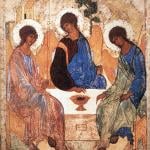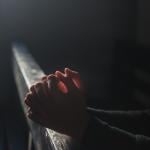Washington D.C., Oct 18, 2016 / 03:25 am (CNA).- C. Matthew Hawkins stood frozen with fear as the update crackled through the police car radio: the suspect in question is white and 5-feet, 7-inches tall. Hawkins, now a Catholic seminarian who happens to be 6-feet tall and black, was grateful for the news. Why? Because a cop was about to pull a gun on him. In the just over two years since the shooting of 18-year-old Michael Brown in a suburb of St. Louis, the United States has again had to grapple with a topic that has surfaced over and over since the Civil Rights era – police aggression, particularly against minorities. While new movements, such as Black Lives Matter, have been borne as a response to the subject, Catholics argue that the Church also has a role to play in addressing the problem. Furthermore, they note, it’s an issue affecting the Church itself, as Catholics can be and are targets of unprovoked police aggression and profiling. “Fundamentally the issue of aggressive policing does come down to the value we place on human life,” said Hawkins, a seminarian from the Diocese of Pittsburgh currently studying in Baltimore. An African-American who worked as a university professor before entering seminary, Hawkins explained that the question of police aggression and Catholics' response to it is akin to other questions of dehumanization we face in our society. “If you think their lives are expendable and disposable, then you can subscribe to this culture of death, then you don’t become concerned about the high number of unarmed civilians who are dying under contested circumstances.”How big is the problem? In recent months, Catholic leaders have acknowledged the issue, calling for prayer, peace and healing in communities. Bishop Edward Braxton of Belleville, Illinois has written several pastoral letters on race relations in the United States. In a July essay, Bishop Braxton, who is African American, decried violence against both the black community and police officers. He pointed to several incidents of police violence against African Americans and to the murder of police officers in Dallas and Baton Rouge. “We all know that the work of police officers is very difficult and very dangerous. They leave their homes each day not knowing if they will return unharmed. They deserve our respect and gratitude,” the bishop commented. He also said that the problem is by no means pervasive throughout the entirety of law enforcement. “We know the vast majority of police are fair-minded and respect the human dignity and worth of all citizens,” he said. “Some, however, are not. There is documented evidence that bias and racial prejudice influence the attitudes and actions of some police officers.” Exactly how widespread is the problem? It’s hard to say. While the issue of police violence has gained recent attention in the media and on social media, due in large part to the prevalence of camera phones and other recording devices, there is no source of official reports collected on a national level. FBI Director James B. Comey addressed the issue in a 2015 speech at Georgetown, recalling that when he wanted to investigate the matter, he found that “reporting by police departments is voluntary and not all departments participate. That means we cannot fully track the number of incidents in which force is used by police, or against police, including non-fatal encounters, which are not reported at all.” This lack of reporting creates data on police violence that is at best “unreliable,” Comey said, a reality that hampers the nation’s ability to address the issue. However, some independent organizations have tried to piece together national data on police aggression using available resources. The British newspaper The Guardian set up an investigation called “The Counted” to report the people killed by police in the United States, revealing more than 1,146 people killed in 2015 and more than 800 killed so far this year. The Fatal Encounters project has created a database by researching police records and collecting its own data on police violence, which list 1,307 people killed by police aggression in 2015 and nearly 900 by October of 2016. Libertarian think tank The Cato Institute also has scholars assigned to the “National Police Misconduct Reporting Project,” detailing reports of police misconduct, including police shootings, sexual assault, brutality, asset seizure, raids, and false arrests, among other types of police aggression.‘No interest in de-escalation’ Mike, a 20-something Catholic husband and father, has been a recipient of this kind of non-fatal aggression. He told CNA about an incident he and his wife experienced in their Arizona hometown. In late 2014, Mike and his wife were driving home in icy conditions up a hill when his wife, who was at the wheel, slid off the road. They called for assistance, but when the local sheriff arrived, the official also skidded on the same patch of ice, driving off the road and into the couple’s stalled car. What happened next shocked and frightened the young couple. “He got out of the car and immediately started yelling at my wife, cursing her out and calling her an idiot even though he was the one who hit us,” Mike recalled. As the sheriff yelled, the couple’s dogs kept barking in the backseat, at which point the officer pulled out his gun, continued to yell at the couple, brandishing the weapon in their direction, and threatened to shoot the dogs if they did not stop. “It seemed like there was no interest in de-escalation,” Mike said. Eventually a tow truck showed up, and the sheriff went off without apologizing, leaving the couple shaken and scared, still stranded. Mike said he and his wife declined to report the incident to the sheriff’s office because they were not confident anything would be done, because of stereotypes surrounding women drivers, and because they were busy preparing for the birth of their child at the time and wanted to put the incident behind them. Still, Mike told CNA he is thankful that, while scary, the incident did not have a tragic ending. “We're very fortunate I think that we happened to be a 'nice young white couple' and not any sort of minority,” he said.'Just another incident' While incomplete, the data available, both through individual departments self-reporting and from independent researchers, do show a significant problem. Even when unarmed, Hispanic people are twice as likely as white citizens and African-Americans are more than five times as likely as their white counterparts to be killed in a police interaction, according to 2015 data from “Mapping Police Violence.” Further investigation by the Washington Post has found that this racial disparity exists even when crime rates of a neighborhood or socioeconomic background is taken into account – minorities are more likely to experience aggression, especially fatal police aggression, when unarmed than non-minorities. C. Matthew Hawkins recalled his own experience while running errands after teaching a class at the University of Pittsburgh in 2008. While he was walking, a police car pulled up, and the officer got out to question him about a burglary that had occurred nearby. “It was clear that he had made up his mind that I was the one had committed this burglary,” Hawkins recalled. He said that he tried to comply with the officer’s directions, even though the officer was tense and was clearly angry. However, he also was confused and concerned that, being so close to the university and to his parish, someone would walk by and think that he committed a crime. While all these thoughts were going through his mind, he hesitated in response to one of the officer’s demands. “I froze – it wasn’t a decision not to cooperate, it was being caught in the moment and not being able to respond.” Hawkins hesitation made the cop more anxious, and the officer reached for his gun. As this was unfolding, the radio crackled, updating the officer that the suspect in the case was actually a 5-foot-7-inch white male – not a 6-foot tall African American. “He just turned to me and said, ‘I’m just doing my job,’ and drove off,” Hawkins said. Hawkins is grateful that on that day he did not become another statistic – another young African-American man shot or arrested for non-compliance. He said this was not the first time he or his African-American friends have been threatened by police officers. For instance, he was confronted by swearing officers wielding billy clubs while reading in a park during a public festival as a teen. “It still has an emotional jolt every time something like that happens,” he said. “This is just another incident of that.” But there are things that can be done to combat these kinds of interactions, Hawkins stressed, pointing to other memories of being treated in a dignified and respectful way by police officers. He advocated that parishes in particular work to “build bridges” in their communities, especially in communities that are experiencing changing demographics. “I think it’s important for people to work together,” he said, pushing for parishes to engage in projects together, and that such processes help “to break down stereotypes that all the training sessions in the world wouldn’t have accomplished.”Encountering the issue “My father was a policeman, so I have a certain degree of sympathy for the police, but his view always was: Show me these incidents and what I’ll show you back is either ‘poor or lack of training’,” said Robert Destro, law professor at The Catholic University of America and the founding director of the Interdisciplinary Program in Law and Religion. Destro suggested that most examples of police aggression can be traced back to poor training or poor oversight and management of police departments. He pointed to the issue of racial profiling, noting that a profile is a valuable tool for police officers trying to solve a crime, but when a profile is based on race alone, it is inadequate and problematic. These issues, he said, are often “the fault of upper echelons,” who don’t successfully manage police training and community relations, allowing tensions between the community and the department to grow and fester. “When you’re looking at this from a Catholic Social Teaching perspective it’s a question of solidarity and subsidiarity,” he added, noting that churches have a role to play in getting communities together. “It’s only in the local community that you can break down the ‘us and them’ into an ‘us’.” He also commented that while there may be nationwide trends involved, the departments and communities involved each have a distinct, unique character, and thus solution, to the problems they are facing. “The police are not an amorphous entity – there is a local police force where you live,” he said. Destro urged Catholics as well to take action on this issue in their communities. “We shouldn’t be waiting until there’s a crisis,” he stated. “These problems have been around for a long time”A national examination of conscience “This has been a long-term, ongoing relationship of African-Americans with the police,” said Gloria Purvis, a radio host for EWTN and a representative of the National Black Catholic Congress. Purvis said that this breakdown in relations impacts “the average African-American person,” those who have not broken any laws. “Your encounters with police shouldn’t end in death if you’re not doing something that’s actively putting the lives of others at risk or is in the active commission of a crime,” she said, adding that it should concern Catholics that “the value of a human life can become so diminished, even on a whim.” “There are a lot of things that go into a police encounter that we don’t know,” she acknowledged, noting that she has family members who are part of the law enforcement community. “But, what we do know as Catholics is that each person is made in the image and likeness of God and their lives are worthy of dignity and respect, and we shouldn’t cheer or defend their lives being taken because they weren’t sufficiently compliant.” “That's not Catholic,” she stressed. “Whenever there are non-lethal means to subdue someone and keep society safe, we use it.” In discussing the complex and often tense issues surrounding police violence and race relations, Purvis stressed that Catholics should take an honest, faith-first approach. She encouraged Catholics reading secular news sources on these issues to use “the lens of faith” rather than one’s political views as a framework. “We can’t fix a problem if we don’t even state that there’s one that exists and then examine it,” Purvis held. “It’s sort of like we’re going through a national examination of conscience regarding this particular issue.” Read more
















